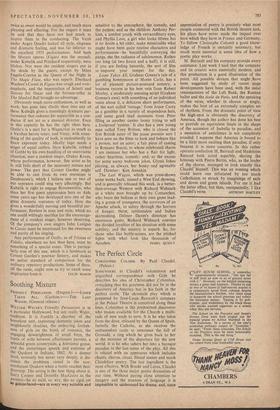The Perfect Circle
SOMEWHERE in Claudel's voluminous and anguished correspondence with Gide he describes his idea of Christopher Columbus, remarking that his greatness did not lie in the discovery of America but in his faith in the perfect circle. The chronicle play which is presented by Jean-Louis Barrault's company at the Palace Theatre is conceived along these lines.. Columbus is the predestined discoverer who makes available for the Church a multi- tude of new souls to save, It is he who takes from the dove, released by the Queen of Spain, Isabella the Catholic, as she receives the ambassadors come to announce the fall of Granada, a ring which he gives back to her at the moment of the departure for the new world. It is he who ushers her into a baroque paradise in the last scene of the play. All this is related with an apparatus which includes chants, chorus, ritual, filmed scenes and much Claudelian poetry. The last ingredient is the most effective, With Brecht and Lorca, Claudel is one of the three major poetic dramatists of our time. Without paying close attention to imagery and the nuances of language it is impossible to understand his drama, and, since appreciation of poetry is precisely what most people connected with the British theatre lack, his plays have never made the impact over here which they have in France and Germany. To follow Christophe Colomb a good know- ledge of French is certainly necessary, but much more essential is some idea of how a poetic play works.
M. Barrault and his company provide every assistance. Last week I said that the company and its creator were essentially modern, and this production is a good illustration of the point. All possible devices that might have been suggested by study of recent stage developments have been used, with the usual reminiscences of the Left Bank, the Russian ballet and the ecole de Paris, and the speaking of the verse, whether in chorus or singly, makes the best of an extremely complex set of rhythms. From the dramatic point of view the high-spot is obviously the discovery of America, though the author has done his best to provide an equivalent finale in the shape of the accession of Isabella to paradise, and a sensation of anticlimax is not completely avoided. I suppose that America is bound to be a little more exciting than paradise, if only because it is more concrete. In this rather operatic confection M. Barrault and Madeleine Renaud both acted superbly, sharing the honours with Pierre Bertin, who, as the leader of the chorus, managed to look exactly like Claudel' himself. This was an evening which could leave one infuriated by too much Catholicism or struck by imaginings of sails and doves and green islands. For me it had the latter effect, but then, unexpectedly, I like


















































 Previous page
Previous page